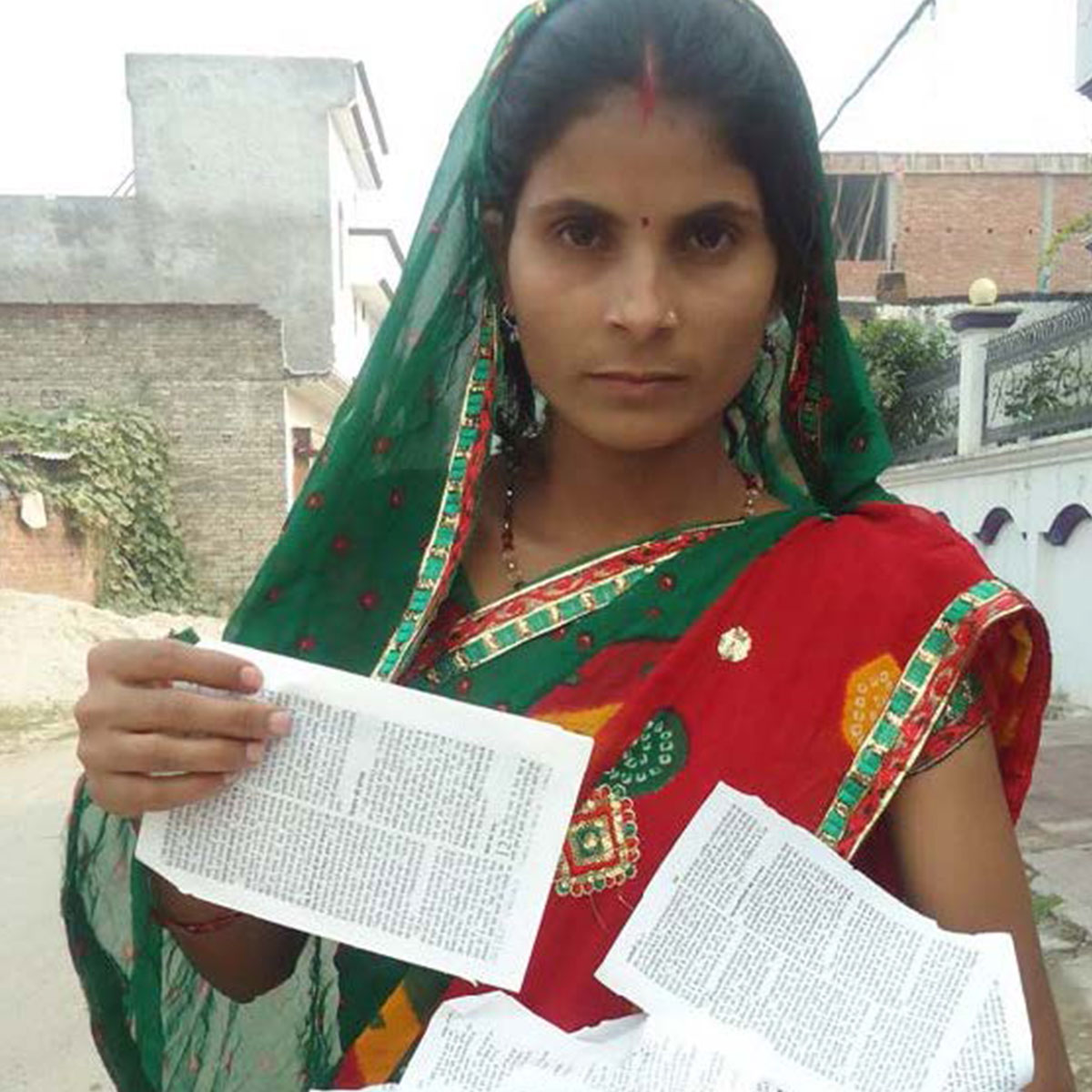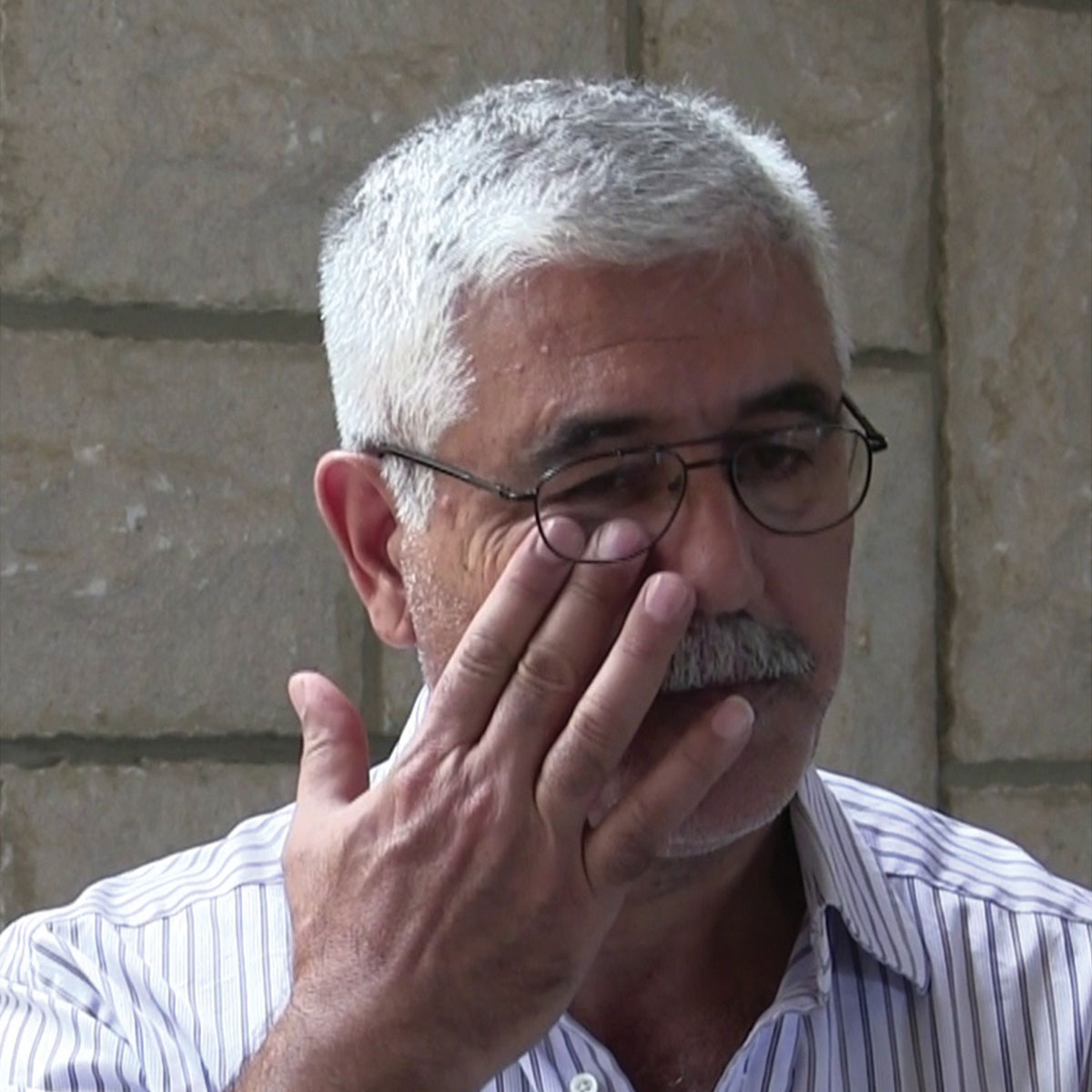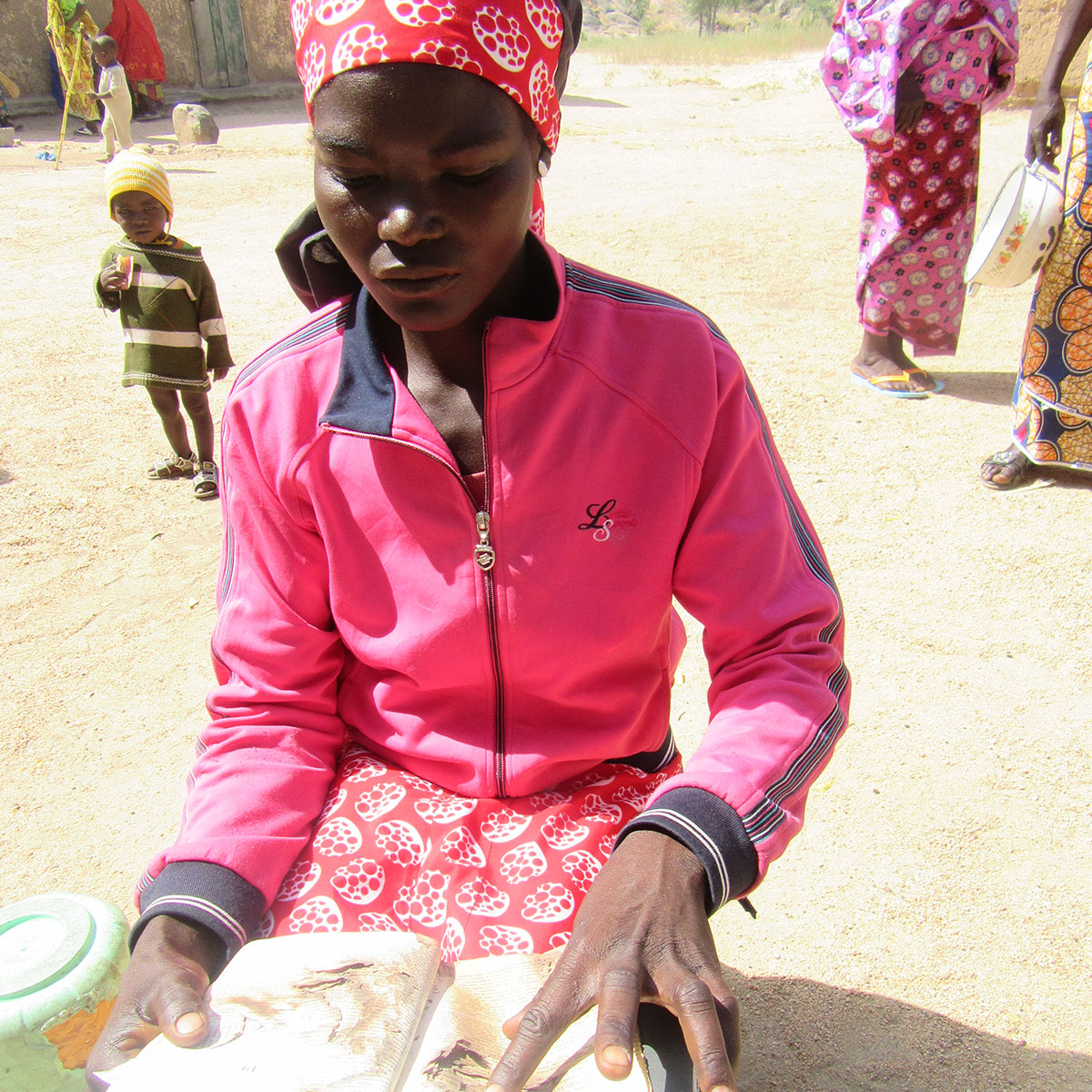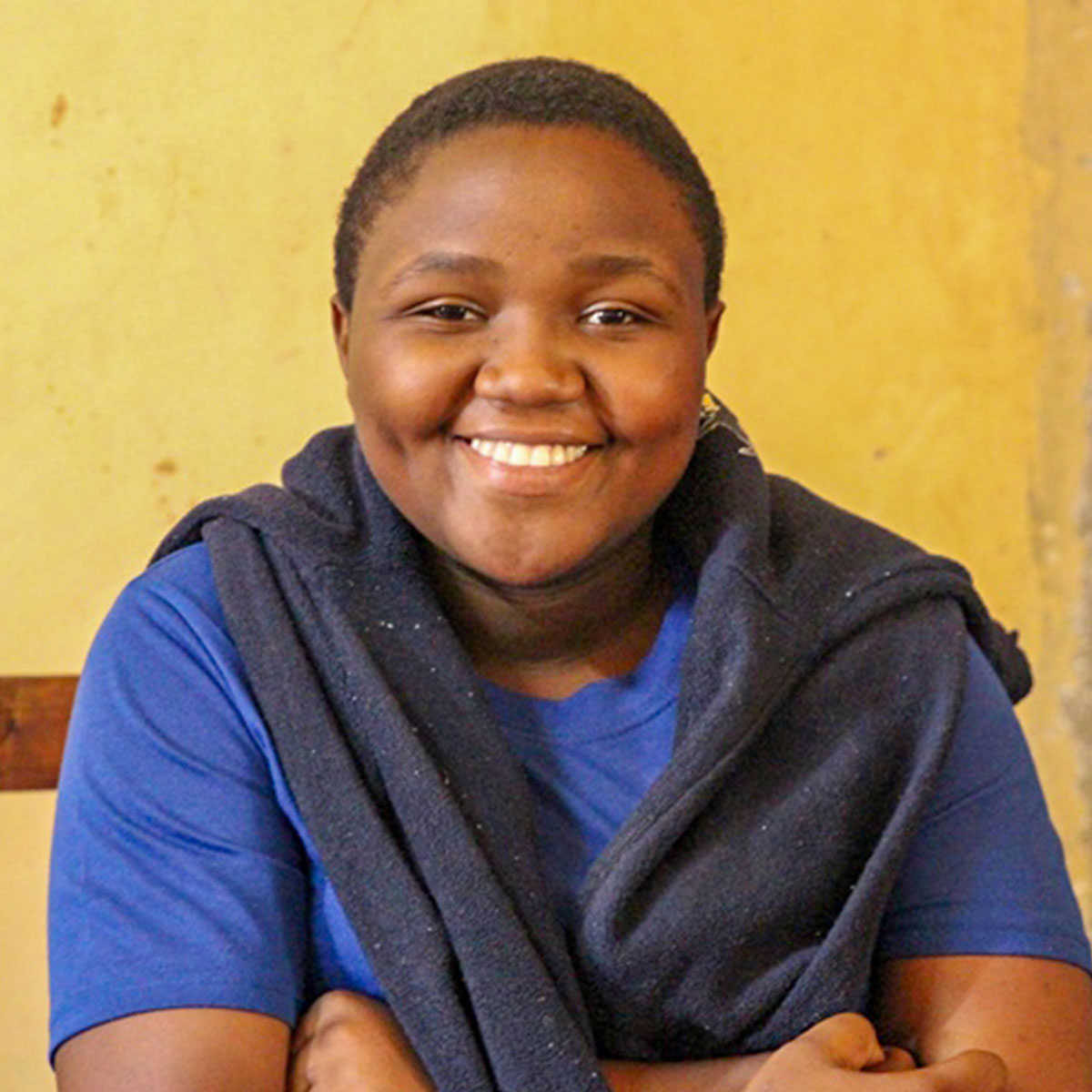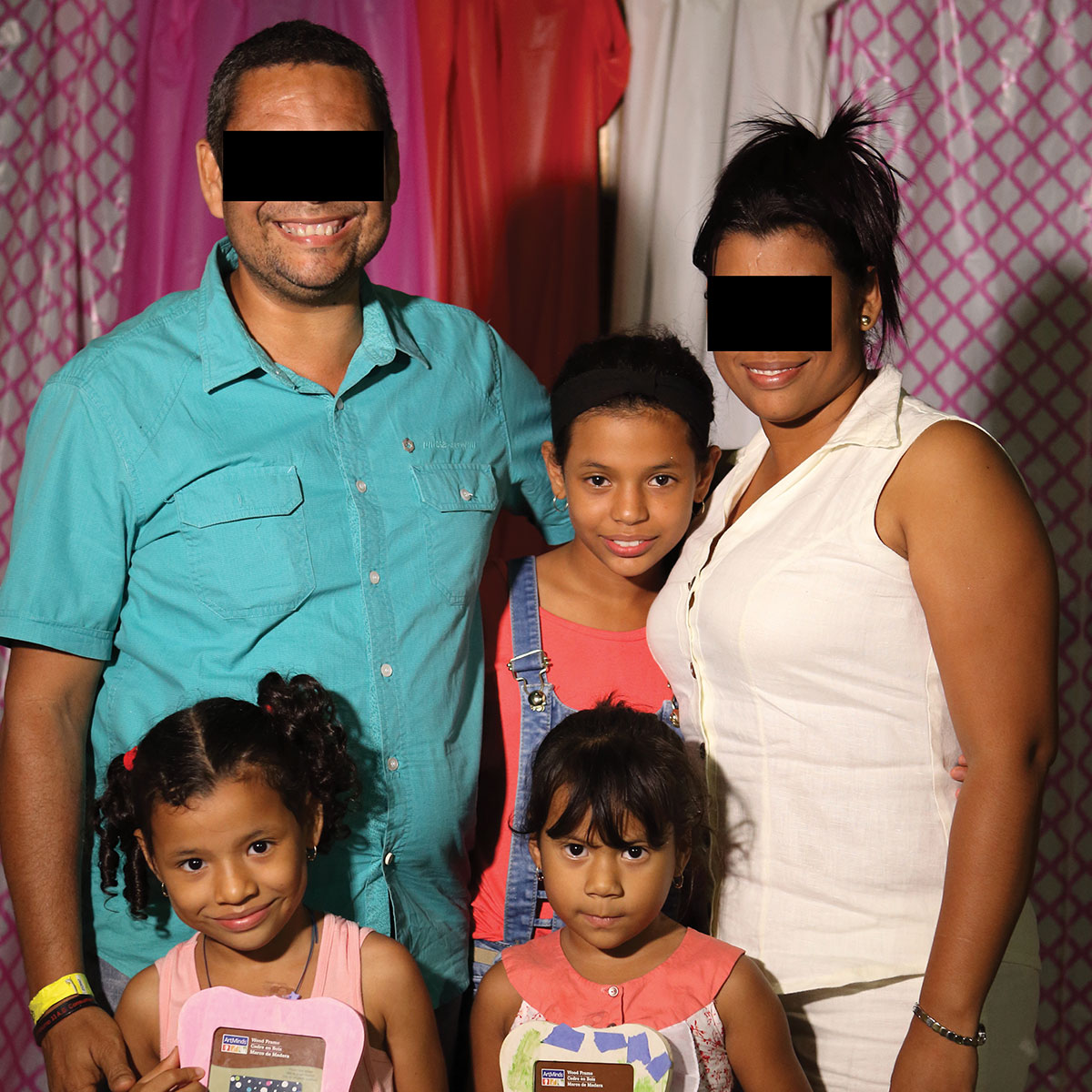Who We Serve
Poonamfrom India
When Poonam quietly left Hinduism in 2012, the Bible she obtained instantly became her most prized possession.
The young Indian wife and mother of three secretly read God’s Word in her home each day, growing in her understanding of God’s love for her. But she feared that her husband would discover her new faith, and he soon did.
After overhearing her praying a Christian prayer one day, he found her Bible and angrily tore it to pieces.
“From today on you stop reading the Bible, and as long as you live in this house you better not pray!” he scolded.
Poonam’s husband then beat her, eventually kicking her out of the house and refusing to let her see their young sons and daughter. Her Christian faith cost her everything.
In India, where a rise in persecution of Christians has paralleled the rise in Hindu nationalism, Bibles are a precious resource. They help new believers continue to grow in faith amid persecution.
After losing her Bible and her family, Poonam stayed with relatives and prayed for the return of everything she had lost. A pastor and another believer who lived near her relatives visited Poonam regularly to pray with her. To her great joy, one day they gave her a new Bible provided by VOM. Poonam burst into tears as she received the Bible.
Over time, God answered Poonam’s prayers, restoring her marriage and family. Although her husband has not placed his faith in Christ, his heart has softened toward Poonam and toward the Christian faith. He has even attended church a few times to see how Christians worship.
Poonam reads and studies God’s Word using her new Bible, but she can’t give up the tattered and torn Bible that her husband had tried to destroy. It is, after all, how she first learned about Jesus.
She recently told a VOM worker that Isaiah 41:10 has special meaning for her: “Fear not, for I am with you; be not dismayed, for I am your God. I will strengthen you, yes, I will help you, I will uphold you with My righteous right hand.”
“My Bible is everything to me,” Poonam said. “It is the living word of God. Without it, I can’t live.”
Yusuf from Syria
“Yusuf” is painfully aware of the time that has passed since his 31-year-old son, “Faruq,” was kidnapped in Syria.
“It’s been one year, nine months and 20 days,” he said, holding a small photo of his son.
Yusuf doesn’t know where Faruq is, but he believes that he is alive because of his potential usefulness to his Islamist kidnappers. Faruq has a background in computer science, and the Islamists often kidnap skilled professionals that they need for their operations. Like many others whose family members have been kidnapped by Islamists, Yusuf knows nothing about what has happened to his son. But his faith in Christ gives him a hope that few other Syrians have.
“I always pray, ‘Let Your will be done, Lord; You are a good God,’” Yusuf said. “David was not better than me. He lost his son, and I am encouraged by that fact when I go to the Bible. I am not the only one who lost his son. But other things I say, ‘Lord, You give him to us and You can take him whenever You desire.’ Those are the things that come to my heart when I go before the Lord.”
In 2012, the Syrian civil war forced Yusuf, his wife, their two daughters and Faruq to flee the Christian town of al-Hamidiyah, in the city of Homs.
“There is no human life in it anymore because of this war,” Yusuf said. “The rebel radicals came into the Christian town, but God was great and rescued us. The way God provided water for us, it started snowing. We began to gather the snow and bring water out of the snow so we could drink and use that.”
The family relocated to a new city, where their “journey of suffering,” as Yusuf calls it, began. It was this journey that ultimately deepened their Christian faith.
About two years after losing their home, Faruq simply disappeared one night. Yusuf and others searched area prisons and jails but didn’t find him. Then they received a call from the Islamists, demanding a ransom. Yusuf and his family have continued to hear mixed reports on whether he has been killed, but they believe that he is alive.
Yusuf said his greatest pain is caused by not knowing where Faruq is.
“Someone burst my heart,” Yusuf said tearfully, still holding the picture of his son.
He keeps a different, mental image of his son in his mind — an image of God’s hand covering Faruq. Yusuf also clings to scriptures that tell him not to trust in earthly kingdoms or powers, but to “trust in the Lord your God.”
“What breaks my heart is his mother,” Yusuf said. “She is not able to cope with the reality of losing her only son. We raised him, we walked with him every inch, every step of his life. We walked that journey with him as a family. Every minute was so valuable of his life and our lives, and then all of the sudden we lost him. He vanished.”
Yusuf uses everything from humor to faith to help his wife deal with her suffering.
“I try to take her away from that painful part of her life,” he said. “I encourage her to go to prayer service, to Bible study and to meet with and fellowship with the brothers.”
Yusuf admits that his relationship with God has suffered since his son’s disappearance. He said he argues with God, asking where He is in the situation and why he can’t know anything about his son. Between the arguments, however, he said he feels God’s peace.
“I wake up in the middle of the night, and sometimes I hear His voice and it comforts me,” he said.
Yusuf said fellowship with other believers has helped him stay strong through all of his family’s trials.
“They keep lifting me in prayer, and they always ask about me and they check on me,” he said. “That fellowship of encouragement is great for me and my family because even when I am not there, I know they are praying for me. They are praying for my son. One of the prayer gatherings they do for an hour and a half, and I know in that hour and a half my son and my family and I are being lifted. That is just encouragement for me and my family.”
Yusuf is also encouraged by seeing how God uses others to minister to him and his family.
“Out of nowhere they just come and help me,” he said. “It is incredible how God is providing. We have nothing, but we have something because of God’s provision in our lives through the fellowship of the believers.”
Yusuf continues to help Syrian refugees through volunteer work with his church. Having experienced the same hardships the refugees are facing, he knows that what will help them the most is coming to know Christ.
Even after losing everything — his possessions, his home, his job and his son — Yusuf said following Jesus is worth it.
“We have not sacrificed [anything compared with] what God has sacrificed for us,” he said.
Rebekahfrom Nigeria
As Rebekah stood on a hill just outside her Nigerian village one hot day in 2014, she could do nothing but watch as her house and church burned to the ground.
She and her neighbors were devastated at the sight of their village in flames and helpless to defend themselves against the heavily armed Boko Haram militants who had caused the destruction. But for Rebekah, that wasn’t the worst of it; she later learned that her husband and a son had been killed in the attack.
Seven months after Rebekah’s life was so radically altered by the Islamist attack, Nigerian military forces pushed Boko Haram out of the region. Though the destruction was widespread, government authorities allowed Rebekah and the other villagers to return to the charred remains of their homes to reclaim what was left. As she sifted through the ashes, Rebekah’s heart filled with hope at the discovery of her burned but still usable Bible.
She bent over, carefully picked it up and brushed away the ashes. “Thank you, Lord,” she sighed.
Although parts of Genesis and Revelation were burned, the rest of her Bible survived intact. As she continued to mourn the loss of her husband, a son, her home and her church, the charred Bible was a source of great comfort.
“Each time I open my Bible during my studies, it reminds me of God’s faithfulness,” she said. “Seeing the ashes of some [pages] I could no longer read makes God’s Word more alive in my heart.”
Rebekah said she takes special encouragement from verses describing the Lord as a husband to widows. “I always look up to the Lord for every need,” she said. But she looks primarily to the Book of Job for solace. She said it helped her realize that her relationship with God is all she really has.
“Job said, ‘Naked I came and naked I go back,’” she explained. “He didn’t come with anything and he is never turning back to God with anything. The Lord has given and the Lord has taken.”
Rebekah still chooses to use her burned Bible today. While a new one would be nice, her tattered copy has gotten her through some difficult times. It’s the Bible her church gave her when she and her husband married, and it’s the Bible they read to their children every day.
Persecutors often try to weaken the faith of Christians by taking or destroying their Bibles.
And many more believers don’t own a copy of God’s Word in which to seek God’s guidance and comfort as they face persecution.
Even in communist and Islamic countries where governments severely punish anyone caught with a Bible, believers still regularly ask us for them. And The Voice of the Martyrs is committed to filling this need for Bibles in the most dangerous and restricted areas of the world.
Despite the damage caused by fire, Rebekah clings to her treasured copy of God’s Living Word and is grateful that it survived the Boko Haram attack.
“That is what I am still holding onto,” she said.
Susan Ithungufrom Uganda
Soon after 13-year-old Susan Ithungu came to know Christ in 2009, her Muslim father began to beat her, once even threatening to kill her with a knife. After trying for months to persuade Susan to deny Christ, he finally locked her in a small space in their mud shanty. Three months passed before neighbors realized what was happening to Susan and notified the police, who rescued her and took her to a hospital.
A pastor who visited her immediately after her rescue said she was extremely thin and unable to walk or talk. “Her hair had turned yellow, she had long fingernails and sunken eyes, and she looked very slim, less than 45 pounds,” he said.
Sadly, Susan’s story is not unique in Uganda. While 85 percent of the country’s population is Christian, those who convert from Islam to Christianity face persecution and physical abuse from family members if they convert from Islam to Christianity.
Susan suffered from untreated malaria while locked away in the small room, and the months of calcium deficiency affected her growing bones. After two major operations on her left femur, she can now walk with crutches.
VOM provided living expenses for her and her Christian caregiver, Dreda. She and Dreda relocated to another village, where Susan is protected from her father.
Through all of her difficulties, Susan has held onto her faith. “I feel very well,” she said with a smile, “because I’m now with Christ.”
“This girl has gone through a tough time,” the VOM worker said. “She has, however, stood firm no matter what she had to go through, including rejection by [her] father and subjection to walking by crutches. She has pulled through and is growing stronger in the Lord every moment.”
Those who have cared for Susan have helped her realize that God will never leave her in her time of need. Thanks to VOM supporters, she is finishing seventh grade at a school equipped to handle her special physical needs and getting her life back on track. Susan shares her story in churches around the country and encourages other believers to continue to pray for persecuted Christians. She hopes to someday be able to share the gospel with her father and others who hurt her.
“I am happy with life now,” she said. “I did not know that I will be back to school. Whenever I was taken to hospital, I knew my life would be even harder, but God is great. I am still strong. Thank you so much for looking after my life. … Please continue praying for me. I want to study hard and get to university so that I can also help other people who are like me. May God bless you so much.”
Dreda, Susan’s caregiver, said that she, too, is grateful for the help VOM has given Susan. “We have been to the hospital many times because of Susan’s health, but God is faithful because the support we receive has been sufficient to cover us. Thank you for the love, and may God be with you always.”
VOM continues to help children like Susan who are abused or abandoned by their parents after coming to faith in Christ.
Mauricio and Denafrom Colombia
When Dena’s husband, Mauricio, travels to surrounding villages for ministry work, Dena and her three daughters, ages 10, 7 and 5, are left vulnerable. She also knows that each time he leaves could be the last time she sees him. Yet she is convinced that the Lord has called them to minister in one of Colombia’s red zones where the paramilitary and guerrilla groups inflict terror on Christians.
“I’m a little afraid, but I’m trusting the Lord and praying always,” Dena said. “We put our hands in His.”
In order to visit a church outside their village, they must obtain permission to leave from the paramilitary and then get permission to enter another village. If caught trying to leave without permission, they could be sent back home or even killed. Visiting the 15 churches that Mauricio and Dena oversee is a challenge, and even the type of transportation they use can put them at risk.
“Usually people [paramilitary or guerrillas] who are involved in the conflict use [motorcycles],” Mauricio said. “A person can have whatever motorcycle they want. But if there is a need, it will probably be taken away by people in the conflict.”
Owning a car is also a problem. “When someone begins to acquire stuff, he becomes a target for criminal organizations … or people inside the conflict,” Mauricio explained. “If a person is starting to have a better standard of living … then the paramilitary or guerrillas will start asking you for contributions to sustain their conflict.”
These contributions are called “vaccines.” They “immunize” Christians and other villagers against further trouble from the paramilitaries and guerrillas. “If you pay one, you must continue paying them until they decide that you don’t have to pay anymore,” Dena said.
To avoid drawing too much attention to themselves, Mauricio and Dena travel to other villages in the back of a large truck that looks like a military transport vehicle. They cram into the back with more than a dozen other people as well as sacks of grain and chickens. “There have been accidents,” Mauricio said. “They turn, and people have flown out of the vehicle. So it’s a problem. But that’s how we get around.”
Transportation isn’t the only danger they face. While leading a church service in an area where they used to live, Mauricio and Dena were caught in a shoot-out. “We had to lie flat on the floor because bullets were passing over our heads,” Mauricio said.
Despite being surrounded by danger, Mauricio and Dena have an eternal perspective. “Yes, we are afraid, but we do it,” Mauricio said. “It’s true sometimes we preach and we know that in the group we may have paramilitary members. So we get in where we are supposed to preach about Jesus and we preach about Jesus.”
Dena is equally committed to sharing Christ in dangerous areas. “We like expanding the kingdom because sharing the gospel is not an option — it’s a command,” she said. “And He said to share the gospel to every creature. Pray for us because the situation is not easy. But we know that in Christ we are more than conquerors.”
VOM supports more than 8,000 front-line workers like Mauricio and Dena by providing them with the tools they need to advance the kingdom. That also includes conferences where pastors and their wives receive biblical teaching and encouragement.
